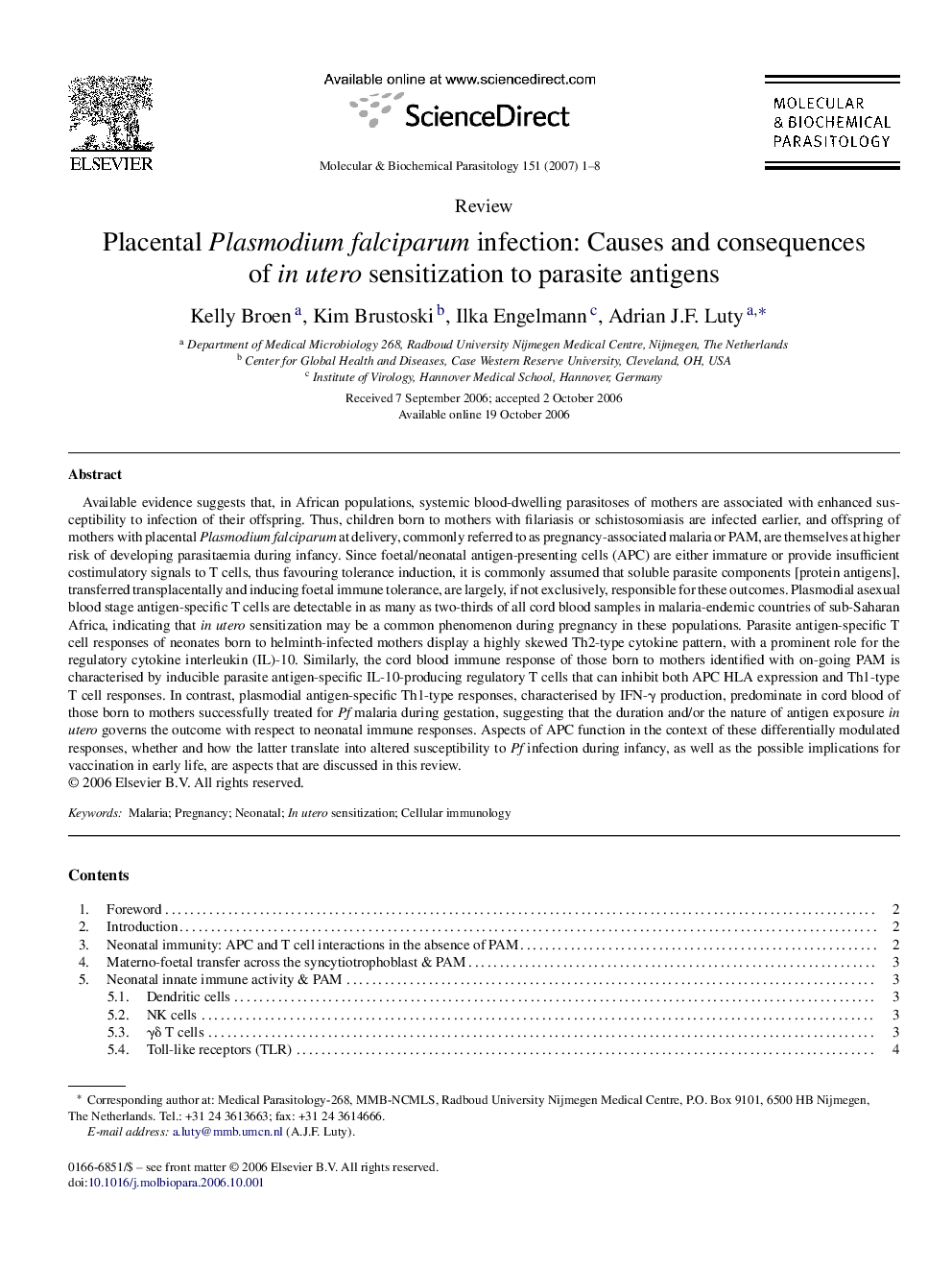| کد مقاله | کد نشریه | سال انتشار | مقاله انگلیسی | نسخه تمام متن |
|---|---|---|---|---|
| 5916205 | 1163375 | 2007 | 8 صفحه PDF | دانلود رایگان |
عنوان انگلیسی مقاله ISI
Placental Plasmodium falciparum infection: Causes and consequences of in utero sensitization to parasite antigens
دانلود مقاله + سفارش ترجمه
دانلود مقاله ISI انگلیسی
رایگان برای ایرانیان
کلمات کلیدی
موضوعات مرتبط
علوم زیستی و بیوفناوری
بیوشیمی، ژنتیک و زیست شناسی مولکولی
زیست شناسی مولکولی
پیش نمایش صفحه اول مقاله

چکیده انگلیسی
Available evidence suggests that, in African populations, systemic blood-dwelling parasitoses of mothers are associated with enhanced susceptibility to infection of their offspring. Thus, children born to mothers with filariasis or schistosomiasis are infected earlier, and offspring of mothers with placental Plasmodium falciparum at delivery, commonly referred to as pregnancy-associated malaria or PAM, are themselves at higher risk of developing parasitaemia during infancy. Since foetal/neonatal antigen-presenting cells (APC) are either immature or provide insufficient costimulatory signals to T cells, thus favouring tolerance induction, it is commonly assumed that soluble parasite components [protein antigens], transferred transplacentally and inducing foetal immune tolerance, are largely, if not exclusively, responsible for these outcomes. Plasmodial asexual blood stage antigen-specific T cells are detectable in as many as two-thirds of all cord blood samples in malaria-endemic countries of sub-Saharan Africa, indicating that in utero sensitization may be a common phenomenon during pregnancy in these populations. Parasite antigen-specific T cell responses of neonates born to helminth-infected mothers display a highly skewed Th2-type cytokine pattern, with a prominent role for the regulatory cytokine interleukin (IL)-10. Similarly, the cord blood immune response of those born to mothers identified with on-going PAM is characterised by inducible parasite antigen-specific IL-10-producing regulatory T cells that can inhibit both APC HLA expression and Th1-type T cell responses. In contrast, plasmodial antigen-specific Th1-type responses, characterised by IFN-γ production, predominate in cord blood of those born to mothers successfully treated for Pf malaria during gestation, suggesting that the duration and/or the nature of antigen exposure in utero governs the outcome with respect to neonatal immune responses. Aspects of APC function in the context of these differentially modulated responses, whether and how the latter translate into altered susceptibility to Pf infection during infancy, as well as the possible implications for vaccination in early life, are aspects that are discussed in this review.
ناشر
Database: Elsevier - ScienceDirect (ساینس دایرکت)
Journal: Molecular and Biochemical Parasitology - Volume 151, Issue 1, January 2007, Pages 1-8
Journal: Molecular and Biochemical Parasitology - Volume 151, Issue 1, January 2007, Pages 1-8
نویسندگان
Kelly Broen, Kim Brustoski, Ilka Engelmann, Adrian J.F. Luty,